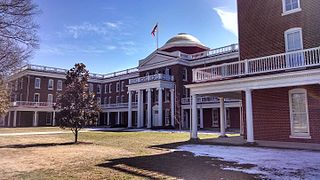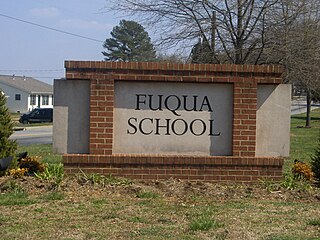School choice is a term for education options that allow students and families to select alternatives to public schools. It is the subject of fierce debate in various state legislatures across the United States.

Prince Edward County is located in the Commonwealth of Virginia. As of the 2020 census, the population was 21,849. Its county seat is Farmville.
Massive resistance was a strategy declared by U.S. senator Harry F. Byrd Sr. of Virginia and his son Harry Jr.'s brother-in-law, James M. Thomson, who represented Alexandria in the Virginia General Assembly, to get the state's white politicians to pass laws and policies to prevent public school desegregation, particularly after Brown v. Board of Education.

Albertis Sydney Harrison Jr. was an American politician and jurist. A member of the Democratic Party associated with Virginia's Byrd Organization, he was the 59th Governor of Virginia in 1962–66, and the first governor of Virginia to have been born in the 20th century.

Oliver White Hill, Sr. was an American civil rights attorney from Richmond, Virginia. His work against racial discrimination helped end the doctrine of "separate but equal." He also helped win landmark legal decisions involving equality in pay for black teachers, access to school buses, voting rights, jury selection, and employment protection. He retired in 1998 after practicing law for almost 60 years. Among his numerous awards was the Presidential Medal of Freedom, which U.S. President Bill Clinton awarded him in 1999.

Segregation academies are private schools in the Southern United States that were founded in the mid-20th century by white parents to avoid having their children attend desegregated public schools. They were founded between 1954, when the U.S. Supreme Court ruled that segregated public schools were unconstitutional, and 1976, when the court ruled similarly about private schools.

Fuqua School is a private primary and secondary school located in Farmville, Virginia. Founded in 1959 as Prince Edward Academy, a whites-only segregation academy, the school was renamed after businessman J. B. Fuqua made a large contribution to the school in 1993.

Alachua County Public Schools is a public school district serving Alachua County in North Central Florida. It serves approximately 29,845 students in 64 schools and centers.
Griffin v. County School Board of Prince Edward County, 377 U.S. 218 (1964), is a case decided by the Supreme Court of the United States that held that the County School Board of Prince Edward County, Virginia's decision to close all local, public schools and provide vouchers to attend private schools were constitutionally impermissible as violations of the Equal Protection Clause of the Fourteenth Amendment.

Lamar School, is an independent coeducational school located in Meridian, Mississippi, United States founded in 1964 as a segregation academy. It consists of elementary, middle, and high school, and serves grades Pre-K through 12th.
Tunica Academy is a K-12 non-denominational Christian private school located in unincorporated Tunica County, Mississippi, near Tunica. The school was founded in 1964 and has been described as a segregation academy. Tunica Academy is an accredited member of the Mississippi Private School Association.

The Mississippi Delta region has had the most segregated schools -- and for the longest time—of any part of the United States. As recently as the 2016–2017 school year, East Side High School in Cleveland, Mississippi, was practically all black: 359 of 360 students were African-American.
The Stanley Plan was a package of 13 statutes adopted in September 1956 by the U.S. state of Virginia. The statutes were designed to ensure racial segregation would continue in that state's public schools despite the unanimous ruling of the U.S. Supreme Court in Brown v. Board of Education (1954) that school segregation was unconstitutional. The legislative program was named for Governor Thomas B. Stanley, a Democrat, who proposed the program and successfully pushed for its enactment. The Stanley plan was a critical element in the policy of "massive resistance" to the Brown ruling advocated by U.S. Senator Harry F. Byrd Sr. The plan also included measures designed to curb the Virginia state chapter of the National Association for the Advancement of Colored People (NAACP), which many Virginia segregationists believed was responsible for "stirring up" litigation to integrate the public schools.
John Segar Gravatt was a Virginia lawyer and trial judge. He is often known as J. Segar Gravatt, although this is also the appellation of his youngest daughter, Jacqueline Segar Gravatt, who was the first woman ordained as an Episcopal minister in Virginia.
Rock Hill Academy was a private high school in Charlottesville, Virginia, established in 1959 when the city's schools were closed rather than comply with orders to desegregate following the landmark Brown v. Board of Education Supreme Court ruling.
John S. Mosby Academy was a private high school in Front Royal, Virginia, established in 1959 when the city's schools were ordered to desegregate following the landmark Brown v. Board of Education Supreme Court ruling. It was named for John S. Mosby, a Confederate colonel.
Jamestown Academy was a private school in James City County, Virginia, established in 1964 when the local public schools were ordered to desegregate following the landmark Brown v. Board of Education Supreme Court ruling.
The Mississippi Red Clay region was a center of education segregation. Before the Brown v. Board of Education decision in 1954, Mississippi sponsored freedom of choice policies that effectively segregated schools. After Brown, the effort was private with some help from government. Government support has dwindled in every decade since. In the state capital, Jackson, some public schools were converted to white-only Council schools. Today, some all-white and mostly-white private schools remain throughout the region as a legacy of that period.
East Holmes Academy (EHA) was a segregation academy in West, Mississippi. The school was founded in 1965 and closed in 2006. In 1989, EHA received national attention after two incidents involving alleged racial discrimination.
Coffey v. State Educational Finance Commission (1969) was a federal case that addressed state support of segregation academies in Mississippi. More broadly, it established the standards the Internal Revenue Service would use to determine the tax-exempt status of private schools based on their segregation policies.









